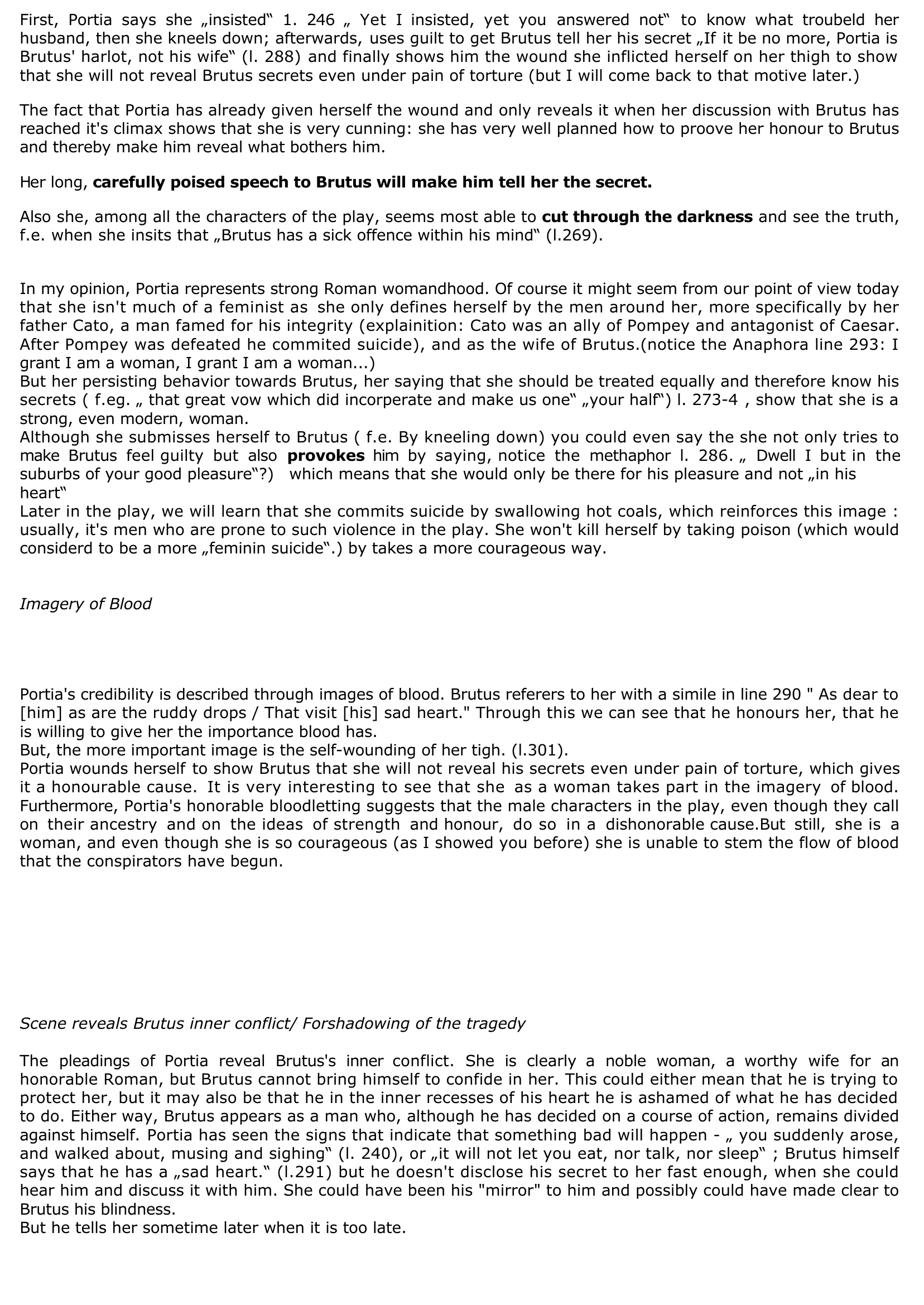Portia and Brutus in Shakespeare's Julius Caesar, Scene
Publié le 13/01/2012

Extrait du document

Analysis
In my analysis, I tried to approach the scene from different angles and to question myself what kind of relationship Brutus and Portia have and what kind of a role Portia plays within the play.
Portias and Brutus marriage Calpurnia and Caesar in contrast The Woman as symbols of the private life
Brutus and Portia's marriage, which is well displayed in this scene, can be contrasted with the one of Caesar and Calpurnia, namely in scene 2.2 (that's the one that directly follows.) The contrast can be mostly seen through the way the couples interact with each other. Brutus and Portia's relationship appears to be based on mutual respect and love (which can be seen (f.ex. line 289 „ you are my true and honourale wife“ or line 275 were Portia refers to Brutus in a metaphor as „her half“); Portia is not afraid to stand up to Brutus and demand that he treat her as a "woman well reputed“. She assmumes that she is entiteld to share her husband's thoughts. Brutus, although not wanting to reveal his secret in the beginning, doesn't treat her condescending at all. Which shows iby the simple fact that she talks a lot in the scene, which means that Brutus doesn't interrupt and respects her.
- Femme de Brutus dans la tragédie Jules César de Shakespeare.
- ASTRONOMIE – L’un des satellites d’Uranus.

«
First, Portia says she „insisted“ 1.
246 „ Yet I insisted, yet you answered not“ to know what troubeld her husband, then she kneels down; afterwards, uses guilt to get Brutus tell her his secret „If it be no more, Portia is Brutus' harlot, not his wife“ (l.
288) and finally shows him the wound she inflicted herself on her thigh to show that she will not reveal Brutus secrets even under pain of torture (but I will come back to that motive later.)
The fact that Portia has already given herself the wound and only reveals it when her discussion with Brutus hasreached it's climax shows that she is very cunning: she has very well planned how to proove her honour to Brutusand thereby make him reveal what bothers him.
Her long, carefully poised speech to Brutus will make him tell her the secret.
Also she, among all the characters of the play, seems most able to cut through the darkness and see the truth, f.e.
when she insits that „Brutus has a sick offence within his mind“ (l.269).
In my opinion, Portia represents strong Roman womandhood.
Of course it might seem from our point of view todaythat she isn't much of a feminist as she only defines herself by the men around her, more specifically by herfather Cato, a man famed for his integrity (explainition: Cato was an ally of Pompey and antagonist of Caesar.After Pompey was defeated he commited suicide), and as the wife of Brutus. (notice the Anaphora line 293: I grant I am a woman, I grant I am a woman...) But her persisting behavior towards Brutus, her saying that she should be treated equally and therefore know hissecrets ( f.e g.
„ that great vow which did incorperate and make us one“ „your half“) l.
273-4 , show that she is a strong, even modern, woman. Although she submisses herself to Brutus ( f.e.
By kneeling down) you could even say the she not only tries tomake Brutus feel guilty but also provokes him by saying, notice the methaphor l.
286.
„ Dwell I but in the suburbs of your good pleasure“?) which means that she would only be there for his pleasure and not „in hisheart“Later in the play, we will learn that she commits suicide by swallowing hot coals, which reinforces this image :usually, it's men who are prone to such violence in the play.
She won't kill herself by taking poison (which wouldconsiderd to be a more „feminin suicide“.) by takes a more courageous way.
Imagery of Blood
Portia's credibility is described through images of blood.
Brutus referers to her with a simile in line 290 " As dear to [him] as are the ruddy drops / That visit [his] sad heart. " Through this we can see that he honours her, that he is willing to give her the importance blood has.But, the more important image is the self-wounding of her tigh.
(l.301).Portia wounds herself to show Brutus that she will not reveal his secrets even under pain of torture, which gives it a honourable cause.
It is very interesting to see that she as a woman takes part in the imagery of blood.Furthermore, Portia's honorable bloodletting suggests that the male characters in the play, even though they call on their ancestry and on the ideas of strength and honour, do so in a dishonorable cause. But s till, she is a woman, and even though she is so courageous (as I showed you before) she is unable to stem the flow of bloodthat the conspirators have begun.
Scene reveals Brutus inner conflict/ Forshadowing of the tragedy
The pleadings of Portia reveal Brutus's inner conflict.
She is clearly a noble woman, a worthy wife for anhonorable Roman, but Brutus cannot bring himself to confide in her.
This could either mean that he is trying toprotect her, but it may also be that he in the inner recesses of his heart he is ashamed of what he has decidedto do.
Either way, Brutus appears as a man who, although he has decided on a course of action, remains dividedagainst himself. Portia has seen the signs that indicate that something bad will happen - „ you suddenly arose, and walked about, musing and sighing“ (l.
240), or „it will not let you eat, nor talk, nor sleep“ ; Brutus himselfsays that he has a „sad heart.“ (l.291) but he doesn't disclose his secret to her fast enough, when she couldhear him and discuss it with him.
She could have been his "mirror" to him and possibly could have made clear toBrutus his blindness.But he tells her sometime later when it is too late..
»
↓↓↓ APERÇU DU DOCUMENT ↓↓↓
Liens utiles
- Julius Caesar I INTRODUCTION Julius Caesar (100-44 BC), Roman general and statesman whose dictatorship was pivotal in Rome's transition from republic to empire.
- Le personnage de CESAR [Julius Caesar]
- PORTIA. Personnage de la tragédie de Shakespeare Jules César
- PORTIA. Personnage de la tragi-comédie de Shakespeare le Marchand de Venise
- Gaius Julius Caesar - Geschichte.


